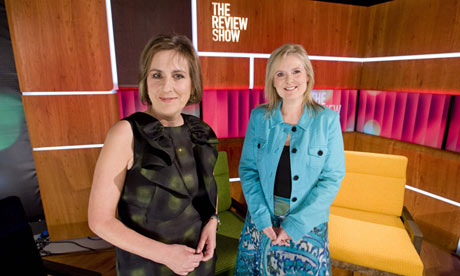
After almost 20 years on mainstream TV, The Review Show is being shunted to BBC4, its weekly slot reduced to a monthly cameo. As John Dugdale wrote in last week's issue, the messages coming from BBC management are, in the words of my fellow panellist Anne McElvoy, "executive code for likely death". I'd known for a while of the quiet euthanasia that was being performed on the programme that I'd loved since, as a pimply teenager, I'd tuned into Tom Paulin, Tony Parsons and Allison Pearson chewing over the cultural significance of Toy Story on the Late Review. Now the world knew too, and a half-hearted #savethereviewshow campaign briefly fizzled into life on Twitter. I made the trip up to Glasgow for my final BBC2 appearance last Friday with a melancholy heart.
In the days following the announcement, my inbox bulged with outraged emails. I'd made many friends in the programme's blood-red green room and we came together to lament the show's marginalisation. Dan Stevens (of Downton fame) struck a rallying cry. "The BBC," he wrote, "needs to own its responsibility to encourage the minds of the nation to leap up and think … " Natalie Haynes (along with John Carey one of the inheritors of the Paulin/Pearsons/Germaine Greer crown) was more elegiac. "I will miss it hugely," she said. "I hope that whatever happens with its incarnation on BBC4 that it is given a chance to breathe before everyone decides it has dumbed-down and is a disgrace."
Moving The Review Show to BBC4 isn't the death sentence that many have suggested (on the Guardian's TV blog Stephen Moss described the channel as a "televisual black hole"). The BBC's arts channel seems a natural home for a programme like this. BBC arts commissioner Mark Bell has suggested that the revamped format will go out at 8pm on a Sunday – again, good news for a show whose younger fans might be expected to be out at the pub on Friday nights (or, indeed, on their way back from the theatre).
What is a travesty is the reduction to once a month. The joy of The Review Show for its admittedly small audience was its topicality. Yes, it was too London-centric (despite its recent move to Glasgow), yes it was on occasion pretentious. But in an unserious age there are too few places where art is addressed with the kind of critical intelligence it received on The Review Show. Insiders suggest that the move to BBC4 is a way of management gently drawing the blinds on the programme, avoiding the possibility of a 6 Music-style revolt. If so, shame on them.
In last week's Guardian's Media Talk podcast, the controller of BBC4, Richard Klein, did his best to paint a rosy picture of The Review Show's future on the new channel. Several times, though, he cited Twitter as the motivation for the move. In a world of instant opinion, he suggested, where everyone's a critic, you don't need a bunch of academics sitting around a table stroking their beards. John Carey isn't even on Twitter (or that was the gist) … This argument is as flawed as it is pervasive at the BBC, where social media is viewed with a mixture of fear and lust. In an age of clamouring online hordes, informed voices are needed more than ever. We now lag even further behind our continental peers in terms of both the amount of arts programming on our televisions and the proportion of budgets devoted to it.
One of the formats in the BBC's titivated arts schedule is What Do Artists Do All Day?; the first subject is Jack Vettriano. This seems to exemplify much of what is wrong with the new order. A show about a middle-brow artist, focusing on the celebrity personality behind the work rather than the work itself. The programme may be memorable, but this sort of thing lends itself more to hagiography than critical insight.
Visual arts are, anyway, well-represented, both through BBC4 and the increasingly watchable Sky Arts channels. Where we will really mark the demise of The Review Show is, as Dugdale also noted, in the complete absence of books from the schedule. It seems strange that a public service broadcaster should leave literature out of its ambit altogether.
I leave the last word to The Review Show's tutelary spirit, Tom Paulin. As a shiftless 17-year-old I put down childish things and picked up The Waste Land after seeing Paulin on the Late Review, and spent three memorable years studying under him at university. Perhaps the programme's predicament comes from never quite replacing those firebrand early critics. "At its best," Paulin told me, "The Review Show was the equivalent of what Hazlitt called "writing to the moment". There was an intoxicating sense of nowness because it was live and anything could happen." Let us hope the move to BBC4 breathes new life into the format.

